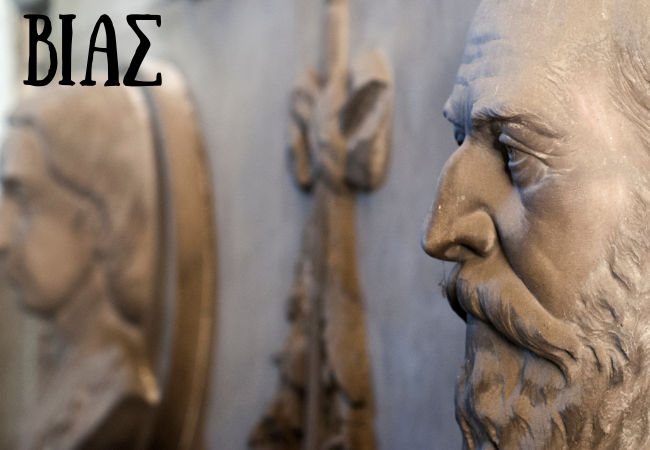One such word is βιασ (bias). But what lies beneath its surface? What stories does it whisper to those willing to listen?
The Etymology of βιασ
The journey of βιασ begins with its Greek roots. Originating from the ancient Greek word “βία,” meaning force or power, βιασ has traversed centuries, evolving in meaning while retaining its core essence of influence.
Evolution Through Time
From the marble forums of ancient Greece to modern-day discourse, βιασ has expanded its reach, weaving itself into the fabric of numerous languages and cultures, each time morphing slightly but never losing its fundamental character.
Cultural Significance
In ancient Greek literature, βιασ was more than a word; it was a concept deeply intertwined with the human experience. The heroes of Homer’s epics, the philosophical discourses of Plato and Aristotle—all grappled with the forces embodied by βιασ.
βιασ in Modern Context
Today, βιασ permeates our daily lives, from media narratives to personal interactions, continually shaping perceptions and realities.
Philosophical Perspectives
The great thinkers of Greek philosophy pondered the implications of βιασ. For Aristotle, it was an element of persuasion, a tool that could sway minds and shape destinies.
Interpretations by Modern Philosophers
Modern philosophers have built upon these foundations, exploring βιασ through the lenses of ethics and epistemology, examining its role in the pursuit of truth and justice.
Linguistic Aspects
Pronunciation and Usage
In its original Greek, βιασ is pronounced as “VEE-as,” a whisper of its ancient power. In contemporary usage, the term bias has become ubiquitous, shaping dialogues across fields.
Variations in Modern Languages
While the core concept of bias remains, its expression varies across languages, each adding its unique flavor to the term.
βιασ in Literature
βιασ in Classical Texts
From the tragedies of Sophocles to the comedies of Aristophanes, βιασ has been a central theme, a force driving characters towards their destinies.
Contemporary Literary Examples
Modern literature continues to explore βιασ, often as a subtle undertone, reflecting the complexities of human nature and societal structures.
Psychological Impact
The Power of βιασ on the Mind
βιασ holds a mirror to our subconscious, revealing the undercurrents of thought that steer our decisions. It’s a reminder of the unseen forces that influence us.
βιασ and Emotional Responses
The presence of βιασ can evoke strong emotions, from the warmth of familiarity to the sharp sting of prejudice, each response a testament to its profound impact.
Artistic Representations
βιασ in Visual Arts
Artists have long been inspired by the concept of βιασ, translating its abstract nature into visual forms that challenge and provoke.
βιασ in Performing Arts
In theatre and dance, βιασ becomes a dynamic force, driving narratives and character development, mirroring the tensions of the human experience.
βιασ in Everyday Life
Common Uses of βιασ

In everyday conversation, we encounter βιασ in subtle forms—preferences, inclinations, prejudices—all shaping our worldviews.
Symbolic Representations
Symbols of βιασ are woven into the fabric of culture, from the scales of justice to the duality of yin and yang, each representing balance and imbalance.
βιασ in Music
References in Classical Music
Composers have long drawn upon the themes of βιασ, crafting symphonies that echo its complexity and depth.
Modern Musical Interpretations
In contemporary music, artists explore βιασ through lyrics and melodies, capturing its essence in new and innovative ways.
Mythological Connections
βιασ in Greek Mythology
In the myths of ancient Greece, βιασ was often personified, a force wielded by gods and heroes alike, shaping destinies and altering fates.
Mythological Figures Associated with βιασ
Figures like Zeus and Athena wielded βιασ, embodying its dual nature of power and justice, control and influence.
Social Implications
βιασ in Social Movements
Throughout history, βιασ has played a pivotal role in social movements, influencing the course of justice and equality.
βιασ and Human Rights
The struggle against unjust βιασ is at the heart of the fight for human rights, a battle to ensure fairness and equality for all.
Scientific Views
Psychological Studies on βιασ
Researchers delve into the cognitive roots of βιασ, uncovering how it shapes our perceptions and decisions, often without our awareness.
βιασ in Neuroscience
Neuroscience sheds light on the neural pathways of βιασ, revealing its intricate connections within the brain and its impact on behavior.
βιασ and Conflict
βιασ in Historical Conflicts
From ancient wars to modern disputes, βιασ has often been a catalyst for conflict, a force that divides and conquers.
Mediation and Resolution
Understanding βιασ is key to resolving conflicts, finding common ground, and fostering peace.
Conclusion
The Eternal Influence of βιασ
βιασ, in all its forms, continues to shape our world, a testament to its enduring power. Whether a subtle whisper or a roaring gale, it influences, inspires, and challenges us.
Final Reflections
As we navigate the complexities of our lives, may we remain aware of βιασ, striving for balance and understanding in all that we do.
FAQs
- What is the origin of the word βιασ?
- The word βιασ originates from the ancient Greek term “βία,” meaning force or power.
- How does βιασ influence modern society?
- βιασ shapes perceptions, influences decisions, and plays a pivotal role in media, politics, and personal interactions.
- Can βιασ be positive?
- Yes, βιασ can be positive, such as when it manifests as a preference or inclination that guides beneficial choices.
- How is βιασ depicted in art and literature?
- βιασ is depicted in various forms, from classical texts and visual arts to modern literature and performing arts, often highlighting its complex nature.
- Why is it important to understand βιασ?
- Understanding βιασ is crucial for fostering fairness, resolving conflicts, and promoting a more equitable society.




